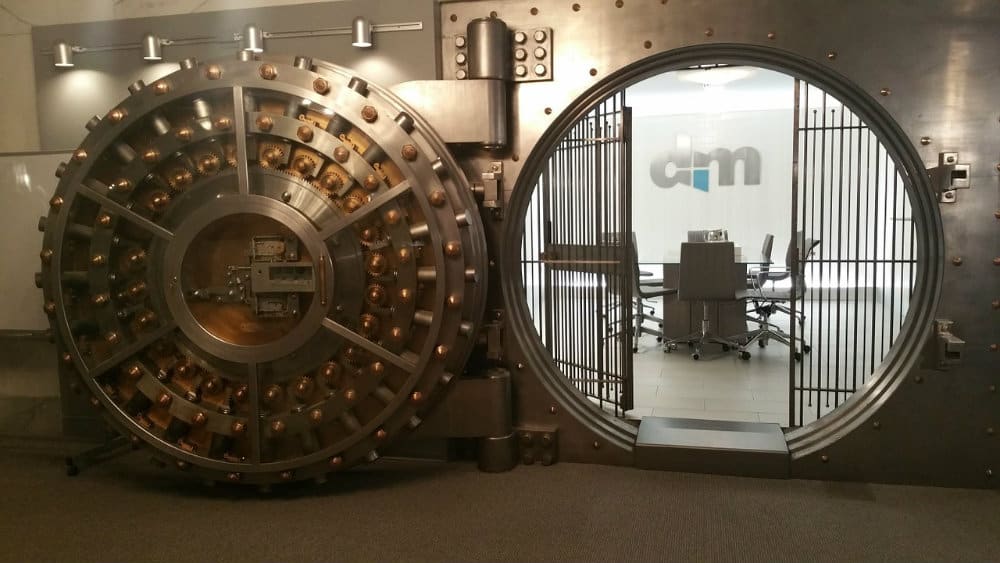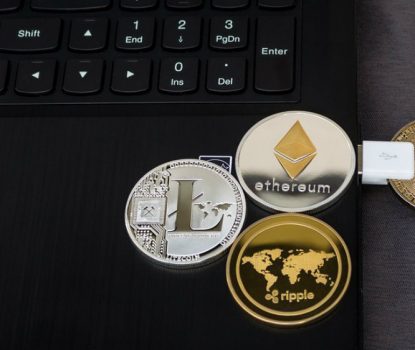One of the challenges most people come across when getting into cryptocurrency space is the dilemma of how to safely store all acquired cryptocurrency. There are lots of different options for storage, each with its own advantages and disadvantages, with the major trade-off being between the level of security and the ease of use. The fundamental vision for all blockchain technologies ‘decentralize and get rid of the middleman’ shows its downside, every average user have to take full responsibility for safe storing owned coins. In other words, if one loose private key or lets somebody else uses it – all crypto is gone for good, there is no ‘central body’ to apply for a refund, no way to withdraw transaction.
Within the traditional fiat currency banking system, you store a portion of your money within a bank. Funds can be sent into your bank account and you’re able to send funds to other accounts. In the case of sending money to another account, you’ll need to know the account number, routing number and some personal details of the receiving party. The bank will charge you a transfer fee, and the funds will hit the receiving party’s account. If somebody else comes into a bank branch and manages to transfer money from your account, it is a bank that is responsible and at some point would have to refund. When a bank goes bust, in most countries there is a guaranteed amount all depositors would get refunded (at least to the point when too many banks go bust at the same time).
With cryptocurrency, you store your funds on the blockchain effectively, and you keep your private key in some form of wallet – that’s the only way to access your funds on the blockchain. This wallet isn’t owned by anyone else but you (i.e. there’s no bank that runs your wallet service for you). Similarly to the traditional banking system, you can send and receive funds to other people. To do this, you need the public key of the receiving party as well as the public key and private key for your own wallet.

Like anything valuable, cryptocurrency needs to be protected, and there is no additional safety net like in most traditional centralized fiat world, we are the owner is the only person responsible and there
- Exchange wallet eg Coinbase,
Binance , Kraken - Software/Online/Mobile wallet eg. Jaxx, Coinomi
- Hardware wallet eg Trezor or Ledger
- Paper/offline wallet eg MyEtherWallet/MyCrypto
None of the options is 100% secure, there are different pros and cons, so probably the best way to store cryptocurrency is to use a mix of different options that is most suitable at the time, and making sure not to put all eggs into one bucket. What are the main areas worth considering when we choose cryptocurrency wallets
- Cost – is the service/device expensive, do I want to spend a lot on safety?
- Security – does the company behind the device/service have a good reputation?
- Mobility – is it easy to keep and difficult to lose? Is it accessible anytime, anywhere?
- User-friendliness – is the wallet easy to use? How many different coins can I store?
- Style – will I use it to impress friends with cool tech? Or just need a piece of paper hidden away?

EXCHANGES
Many newcomers buy cryptocurrency from an exchange or P2P service and leave their holdings in those sites wallets. But like any other online entity, the exchanges are vulnerable to hacking as they are particularly attractive targets. A short history of crypto exchanges gives examples of Mt. Gox, Bitfinex, NiceHash and many many others. Of all the options available, this is most cases the least secure. The reason for this is that most exchanges are in fact centralized, meaning that they’re operated by a single entity that manages the security of your data for you. This may sound good but it means that if someone manages to hack their platform, all of your details – and those of the rest of their user base – will be exposed. You’ll only really want to store your crypto in an exchange at the point when you’re planning any trading. Once you’ve completed a trade, the best thing to do is then transfer it out of there and into a more secure solution, like a hardware or paper wallet. Due to the minuscule transaction fees, this is simple and cheap to do. If for some reason you need to keep crypto in exchange wallet, make sure it is a reputable one, that is backed by large investors, for all cost avoid new created ‘local’ exchanges.
SOFTWARE/MOBILE/ONLINE WALLETS
There are three main flavors of software wallets: desktop, online and mobile. Each offers a different combination of convenience and security.
Desktop wallets are software you install on your computer. They give you lots of control over your assets but, if connected to the internet, remain vulnerable. A malware infection, the remote takeover of your computer or even if you’re not online a hard-drive failure could be a catastrophe. Online wallets are hosted on a website. This makes them convenient because they’re accessible from any internet-connected device. The downside: Your private keys are kept by the website owner and, from a technical perspective, there’s not much to stop them from simply taking your coins.
Mobile app wallets are optimized for retail transactions that are, paying for stuff with bitcoin or another cryptocurrency. But because your encryption keys are stored on your phone, you lose your coins if you lose your device. You thought it was a bummer to leave your phone in a taxi? Imagine how bad it will be if it has thousands of dollars of cryptocurrency locked on it. Relatively similar in functionality to a mobile wallet, an online wallet lives on the cloud and can be accessed from any device. They’re very handy for making quick transactions from any location/device, but the private keys are often controlled by the online wallet provider, meaning that if they get hacked, you could lose everything. As an extra security precaution, always set up 2-factor authentication on the exchange if they offer it and make sure you use a unique password.
HARDWARE WALLETS
Hardware wallets are much more secure than previous options. They often come in the form of a flash drive type device, the most popular of these being either provided by Trezor or Ledger. This wallet operates offline and manages your private key for you, so even if someone steals the device itself, they can’t actually access your funds. That said, depending on

PAPER WALLETS
A paper wallet is one of the most secure ways to store your cryptocurrency. That said, they’re not always the most user-friendly. You can set up a paper wallet through a service like MyEtherWallet, MyCrypto or WalletGenerator.net and it will simply generate a public and a private key for you. Only you will have access to this information, and if you lose it, it’s gone forever. Once your public and private key are generated, you’ll also often get a QR code that you can use as well. The public key, private key, and QR code can be printed off onto a piece of paper (hence, “paper wallet”) where you will store the details. It’s vitally important that you store these in a safe place, and I’d even consider laminating the paper to avoid damage from liquid spillages. The final thing to remember here is that if someone steals the piece of paper with all these details on then they’ll get full access to all of your funds – this is where it is advised to find a safe place to store them in.

As a rule of thumb, if you’ve got more virtual currency than you’d be comfortable carrying around on you in cash, or you intend to hold it as a long-term investment, you should keep it in “cold storage.” This could be a computer that’s disconnected from the internet, a hardware wallet or paper wallet. Whether you choose a hardware, software or paper wallet to manage your passwords and private keys, there are things you can do to keep your cryptocurrency safe.
- Try to keep your cryptocurrencies in few wallets – possibly from different companies
- Don’t give anyone your private keys (to all your stash) – remember using online wallets means you give your key away
- Keep any larger amounts, that you don’t plan to use within a short period of time in cold storage – not connected to the internet
- Be careful with any online service – any device connected to the internet is vulnerable
- Encrypt your wallet with a strong password and store the mnemonic seed phrase in a safe place
- Always check the address before confirming a transaction
- Make regular backups and store them in multiple locations
- Use two-factor authentication security, which helps maintain control of your coins even if one of your devices is compromised
Can I Store All Types of Crypto in One Wallet?
This is where things start to get a little more complicated, currently, there isn’t a wallet that can store cryptocurrency – any cryptocurrency

